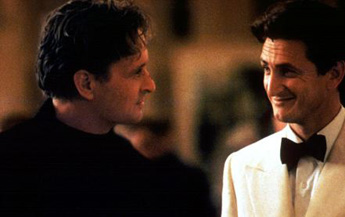Are You With Us?: The Game
By Ryan Mazie
September 12, 2011
BoxOfficeProphets.com

When coming across The Game, I was surprised to have never heard of it before. Starring A-listers Michael Douglas and Sean Penn, directed by David Fincher, and heavy on action, The Game seemingly slipped through the cracks. After watching the twisty film, it is easy to see why.
Set in scenic San Francisco, the film stars Michael Douglas as a rich banker, Nicholas Van Orton, whose success came at the price of his family. Nearing his 48th birthday (the same age his father committed suicide), Nicholas has a feeling of dread – and with Fincher’s gloomy shades of gray and cold interiors, the audience knows something is up, too.
The anxiety comes in the form of his rebellious and reckless younger brother Conrad (Sean Penn). Giving Nicholas a mysterious gift card for a “game,” Conrad promises that the game led by the acronym company CRS will change his life (and with Douglas’ seriously dull performance up to this point, any change has to be a good thing). Brushing off the card, Nicholas slowly realizes that the game is already in motion and invading his everyday life. Starting as a mere annoyance, the game uncontrollably escalates into a penetration of Nicholas’ private and professional circles, with definitely immoral and potentially criminal outcomes.
Just as the game goes out of control, I feel like David Fincher and the screenwriters lose control of the movie as well. With a great set-up, the film seems to have no end point. Instead we get a succession of increasingly ridiculous action set pieces that build upon each other. In the end, the momentum comes toppling over into a polarizing conclusion.
The ending is absolutely ridiculous, but played with a straight face; it is just crazy enough to work.
I enjoyed The Game, but that is because I have a relatively high suspension of disbelief. Typical yet surprising, silly yet serious, The Game has a serious case of bipolarity, and if you are willing to let John Brancato and Michael Ferris’ screenplay jerk you around, then you will have a rollercoaster ride of a time. If you dislike feeling misled, then there is a good chance you will turn off the movie about an hour in. No information is handily given to you, and you know nothing more than Douglas’ character who is like a chicken running around with his head cut off.
I am always up for a good chase, and The Game is nonstop escaping. Douglas is perfectly cast, being able to switch from serious to spry, cold to coddling, and content to cross in the matter of seconds. This is his movie and the audience is experiencing it completely through his eyes every step of the way.
Penn is fairly one-note as the younger brother you wish you never had, but his role is less substantial than the trailers would lead you to believe.
Fincher, hot off Se7en, directs the film with more style than needed, elevating The Game from a child’s play affair to something more dark and interesting. With exciting action sequences, Fincher still allows the audience to catch their breath, even though Douglas’s character never has a chance. Fincher is one of my favorite directors, not only for his dark yet epic tones, but also for the fact that he instills faith in his viewers to be able to follow along without their hands being held. However, he might’ve taken that faith for granted as The Game gets so twisted within itself that I even wonder if Fincher knows what it all means.
Screenwriting team Brancato and Ferris write The Game with an unusual amount of back-story for this type of genre film; however, when it devolves into its B-movie antics, it just seems needless. Previously scripting The Net (a film I hate even though Sandra Bullock tries her best to save it), The Game is not all that different, just substituting the crazy computer antics for an evil, arcane corporation and adding dozens of more twists and red herrings.
The problem with The Game is that they do not know where to stop. At a limit-pushing 129-minute runtime, I feel as if they had enough material to double it, instead of editing down.
Brancato-Ferris later went on to write the middling Terminator 3 and the McG reboot, the vastly underrated Surrogates, and the dreadful Catwoman.
While The Game is a past memory, its concept is most definitely with us. Playing a game bigger than yourself has turned into a popular tourist attraction in major cities as a way to see famous sites in an unusual in just the same amount of time as a viewing of The Game. Ashton Kutcher produced the short-lived reality TV series Game Show in My Head that worked off of a similar concept.
Ranked fresh on Rottentomatoes.com at 70%, critics liked the film for its darker sensibilities; however, there was an air of discontent considering the film Fincher did before The Game was the Oscar-nominated Se7en. But the real disappointment came at the box office.
Made for anywhere between the rumored $50 million - 65 million, The Game opened Friday, September 12, 1997 to the tune of $14.4 million ($24.9 million today). However, audiences weren’t willing to play Fincher’s twisted mind games like in Se7en. In the end, The Game cashed out with $48.3 million ($83.9 million adjusted) – a middle of the road number for a Fincher.
If you are willing to give in, The Game is a thriller taut with suspense, but loose on plot. Douglas delivers a grade-A performance, and the film's own gumption makes the unbelievable car crashes and bullet fights seem sort of realistic in their own strange way. While the payoff is not big enough for the amount you invest into the film, the ending is still less frustrating than a game of Monopoly.
Verdict: With Us
7 out of 10